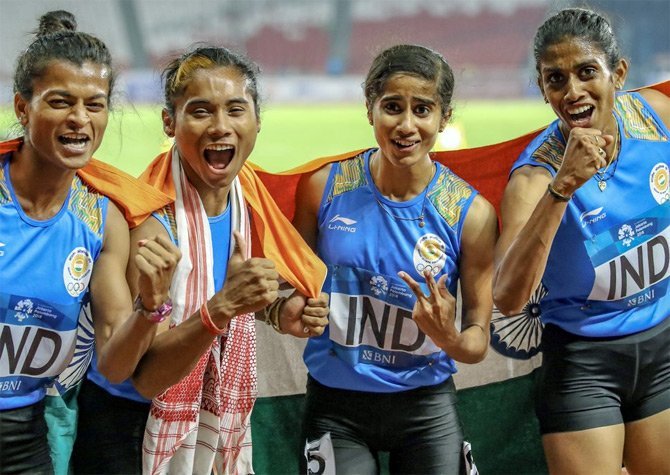India’s combined relay silver at Asian Games 2018 set to be upgraded to gold
Share

India is in line to get the Asian Games gold in the 4×400 blended relay, with Kemi Adekoya of Bahrain being handed a 4-yr ban on the Athletics Integrity Unit (AIU) for failing a dope chick. India’s combined relay crew of Muhammad Anas, Hima Das, Arokia Rajiv, and M R Poovamma received the silver in the event at the Asian Games in Jakarta last year. The ban on Adekoya, who became part of the gold-winning group, means India’s silver is set to be upgraded. The AIU said that Adekoya’s outcomes might be disqualified between August 24, 2018, and November 26, 2018. Following the race, India had formally lodged a grievance against Bahrain for obstruction. However, it was turned down. Adekoya had also won the 400m hurdles gold at the Asian Games, with India’s Anu Raghavan finishing fourth. Raghavan is in line for the bronze.

With the pan-Asian wearing games heading to China in 2010, it’s miles the wish of Guangzhou’s humans that these video games can do to their metropolis what the Olympics did for Beijing and, to a lesser volume, what the World Expo has executed for Shanghai. After winning the right to host the video games in 2004 (as the sole bidder), the town has been working furiously to give itself a prime makeover in time to affect its most important neighbors. Guangzhou has constantly been considered one of China’s biggest and most essential towns. It has been selected with the aid of the central authorities to be the symbol of China for this regionally critical event.
The video games encompass forty-two extraordinary occasions, including many that could in no way make the Olympics (think chess, dragon boat racing, and kabaddi!) that give it a different Asian flavor. But what does it imply for Guangzhou? In a way that the vital government has been throwing trucks of money on the metropolis (particularly due to the fact personal partnerships had been tough to return utilizing at some point of the GFC), it is a poorly saved secret that the video games have blown manner over to start with budgets and notwithstanding the head of the Guangzhou.
Organizing Committee assuring that the video games might be kept below 2 billion Yuan ($293 million US dollars), it was envisioned that the video games have already valued up to four billion. This excessive amount of cash has paid for the construction of 1/2-a-dozen new sports activities stadiums, limitless citywide beautification projects, the relaying of major roads and new vast subway strains, in addition to a ferocious training campaign instructing the citizens of Guangzhou about acting in a more ‘civilized manner’ while the games start.
Make no mistake, although the funding is just about worth it. Despite the 2008 Olympic Games being nearly absolutely written off by the authorities, the infrastructure and projects created in the lead-up to that occasion have left a lasting impact on Beijing nicely after the carnival had packed up and moved on. Many of the most critical marks left on Beijing are the matters that have long gone unseen; planting hundreds of acres of timber inside the deserts of Northern China has made sandstorms in the capital much less common.
The restrictions on riding automobiles on certain days of the week have decreased emissions within the capital and reduced emissions by 20%. Even the block-by-block campaign to make Beijingers less Chinese and more like-minded with foreign cultures (that includes, as a minimum, seeking to line up) has left a seemingly indelible albeit constrained trace, no longer to mention the fundamental capital works like new subway strains that residents now experience.















